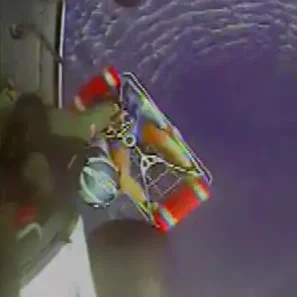MIAMI – A fishing trip in the Gulf of Mexico ended with a U.S. Coast Guard rescue for seven people after their boat was struck by lightning.
Officials said the boaters’ vessel became disabled after it was hit by lightning off Clearwater, on Saturday.
“The weather started to turn,” said USCG Petty Officer First Class Ayla Hudson.
Cellphone video captured the sudden strike.
“Monitor the weather, especially in places like Florida, where lightning is very common, especially in the summer,” said Hudson.
The lightning strike fried the electronics on board the boat, leaving the group stuck 100 miles off the coast of Tampa Bay.
Fortunately, they had an emergency position indicating radio beacon, or EPIRB. The distress device sent a GPS location to the Coast Guard.
“We were able to use the EPIRB signal to get to their location,” said Hudson. “When they saw the Coast Guard coming, they set off flares.”
A USCG air crew hoisted the five women and two men to safety.
The boaters were taken to a nearby air station.
No injuries were reported.
This close call had a happy outcome thanks to the boat’s captain having the proper safety equipment.
Coast Guard officials said things can change quickly on the water, and that’s why they make the following recommendations:
File a float plan. It describes the vessel, including the registration number, as well as the number of passengers, their names and addressed, and an emergency contact.
Make sure you’re equipped with the right safety equipment, including life jackets and flares.
Always have a VHF radio or EPIRB on hand.
Safety was a top priority for boaters on Sunday at Pelican Harbor Boat Ramp in Miami.
“We always take precautions,” said a boater.
“Before we do anything, we check the weather, check the boat, make sure the boat is working properly so we don’t get stranded out there,” said another boater, “check there are life jackets for everybody’s who’s on the boat.”
Boaters said they are also mindful to always keep an eye on the sky.
“As soon as we saw the weather getting bad we decided to pack it up,” said a boater.
Officials urge boaters to head back to dry land before they find themselves potentially in harm’s way.
USCG officials said it could have taken them hours to find the boaters if they didn’t have an EPIRB.


 DOG RESCUED AFTER SLIPPING INTO BISCAYNE BAY F
DOG RESCUED AFTER SLIPPING INTO BISCAYNE BAY F
 KIM KARDASHIAN, PETE DAVIDSON BREAK UP AFTER
KIM KARDASHIAN, PETE DAVIDSON BREAK UP AFTER 
 Lowest gas prices in Miami, August 6th. #Bugl
Lowest gas prices in Miami, August 6th. #Bugl
 CONTRERAS HITS 2-RUN HR IN 8TH AS CUBS BEAT MAR
CONTRERAS HITS 2-RUN HR IN 8TH AS CUBS BEAT MAR
 TOWN OF SURFSIDE SETS UP LANDMARK TO HONOR THE
TOWN OF SURFSIDE SETS UP LANDMARK TO HONOR THE
 INSTAGRAM IS EXPANDING NFT SUPPORT TO 100 COUN
INSTAGRAM IS EXPANDING NFT SUPPORT TO 100 COUN